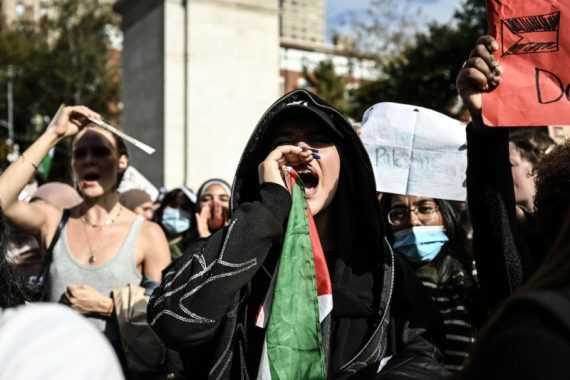T
he investigations into presidents of universities in the U.S. should be seen as a manifestation of a crackdown not only on academic freedom but also on freedom of expression. Pressure on university administrations from Israeli lobbies and donors has played a major role in recent events.
The fact that Israel’s war crimes and crimes against humanity are not limited to the Palestinian people in terms of human rights and freedoms, but have a global impact has become even more tangible with recent news from the United States. News quickly spread that the presidents of Harvard University, University of Pennsylvania, and Massachusetts Institute of Technology (MIT), all leading U.S. higher education establishments, were questioned at a hearing titled “Holding Campus Presidents Accountable and Combating Antisemitism” at the U.S. Congressional Committee on Education and the Workforce. The inquiry was investigating whether they were doing enough to combat anti-Semitism on their campuses.
Although the dates of this news story coincide with the first week of December, a brief investigation reveals that Stella Maris, the newly appointed president of the University of St Andrews in Scotland, was put under similar pressure.
These developments are closely related to the freedom of expression that is an integral part of academic freedom, and are important because they are examples of the extent to which the claim of the West, and especially the U.S., to hold moral supremacy is actually based on a pragmatic framework.
Congressional Questioning of University Presidents: Is Anti-Semitic Discourse a Tool of Repression?
In the incident at the University of St Andrews, Stella Maris, who was elected rector in October, stated in an email that circulated within the university that Palestinians were under a regime of apartheid (siege, collective punishment); that 14,500 Palestinians had been killed in Israeli attacks; and that Israel’s attacks amounted to genocide. In response, the university’s Jewish students called on her to apologize for her remarks and to resign, which she refused to do, stating that she “strongly condemns anti-Semitism and rejects the use of anti-Semitism as a weapon.”
In the examples of the presidents of U.S. universities, it would be appropriate to speak about the direct pressure exerted by official U.S. actors on them. This is because the U.S. legislature, i.e., the United States Congress, questioned Harvard President Claudine Gay, University of Pennsylvania President Elizabeth Magill, and MIT President Sally Kornbluth for three hours. The interrogation, which took place in the context of questions posed by Republican members in particular, provides important clues to the politically motivated blurring of the boundaries of freedom of expression.
Elise Stefanik, a Republican representative from New York, asked Harvard’s Gay whether she condoned demonstrations on campus that included chants of “intifada” and whether she was aware that the term “intifada” often connotes violent armed resistance to the state of Israel, even violence against civilians and denial of the Holocaust. Gay replied that they remain committed to freedom of expression, even when that expression is inappropriate, offensive, and hateful.
Similarly, MIT president Sally Kornbluth was asked whether calling for an intifada during campus demonstrations amounted to genocide of Jews. Kornbluth stated that she believed that these expressions could constitute a crime if acted upon.
The questioning of University of Pennsylvania president Elizabeth Magill took place in the context of the Palestinian Writers Festival organized on the university campus. Republican Representative Jim Banks of Indiana asked why Roger Waters, former member of Pink Floyd, who has been outspoken in his support for Palestine, gave a speech at the festival and why this speech was not prevented. Magill was also asked about allegations that Prof Dr Ahmad Almallah of the University of Pennsylvania had called for an “intifada revolution” and why this faculty member continues to work at the university.
In the aftermath of the hearings, the House of Representatives voted 303 to 126 in favor of a resolution condemning the presidents’ statements in favor of freedom of expression.
Of the three presidents, Magill resigned, while the other two remained in office with the support of their universities.
Read: Nakba 2023 in Gaza
Academic Freedom in the U.S. under Pressure from Donors and Politicians
These events have put the relationship between academic freedom and freedom of expression back on the agenda. While academic freedom is seen as the obligation of academic institutions to produce knowledge, which is one of their primary functions, it also guarantees that both the academics working in these institutions and the academic institutions should not be subject to external pressure to fulfil this duty. Academic freedom includes academics’ right to impart their knowledge and thoughts via their educational activities freely to their students, the right to determine their methods of teaching freely, the right of academics and researchers to conduct their research without any external pressure, the freedom to determine the academic programs and management of academic institutions, i.e. universities, and the right of academics/students to express their thoughts in the public sphere. Many of these dimensions are closely related to freedom of expression.
Freedom of expression refers to the right of individuals to communicate their thoughts to the outside world through various means such as, among others, writing, painting, speech, poetry, demonstration, press and media organs, cinema, theatre, etc. Academic freedom not only guarantees an individual the right to think freely, but also the right to express these thoughts freely, by peaceful means, without being subject to external influence. Academic freedom, in fact, is interconnected to freedom of expression. Academic freedom can also take the form of a demonstration or protest march on a campus.
Recommended
A Tale of Regression
The president investigations in the U.S. should be seen as a manifestation of pressures not only on academic freedom but also on freedom of expression. The gains in the area of academic freedom in the U.S. are not very old; before 1960, there was serious pressure and censorship on academics. This pressure, which was quite intense, reached its peak in the 1950s with the practices of the McCarthy era, and academic freedom and academics suffered a serious blow on the grounds of the fight against communism. Since the 1960s, however, both academics and students in the U.S. have benefited from the rising tide of freedom after the Vietnam War and have made serious gains in a process that continues to this day.
As a result of the inquiries, public opinion—now progressively independent of Western political influence and lobbying pressure—has increasingly begun to argue that not only academic freedom but also freedom of expression is under threat, and it seems that a discussion of regression has flared up. In a sense, the gains made since the 1960s and 1970s are at the center of these debates, as is the concern that the ambitions of politicians and donor lobbies to intervene in universities for their own political interests have become a threat to academic freedom. In recent events, the pressure exerted on university administrations by Israeli lobbies and donors has been decisive. This pressure has been, in fact, taken to a higher level and efforts have been made to equate the slightest criticism of Israel with the accusation of anti-Semitism.
It is difficult to predict how far this pressure on universities will go. But it seems that a Pandora’s box has been opened. With both conventional weapons and its economic and political power, Israel seems to have started trying to silence academics who can influence public opinion by turning the discourse of anti-Semitism into an instrument of pressure. However, the picture that emerges today is that this has backfired. Although political actors have made no effort to respond, the first indication that public opinion is more inclined to protect academic freedom can be seen in the decisions to keep the two university presidents in office.
The scope of this article is limited to the US, but the possibility that recent developments in the U.S. could have a domino effect in other Western countries should not be ignored. Those who wish to see the extent of this potential can take clues from the attitude of political actors in Europe’s democracies— with the exception of Spain—while thousands of Palestinian children and civilians are being massacred in front of the eyes of the entire world.





